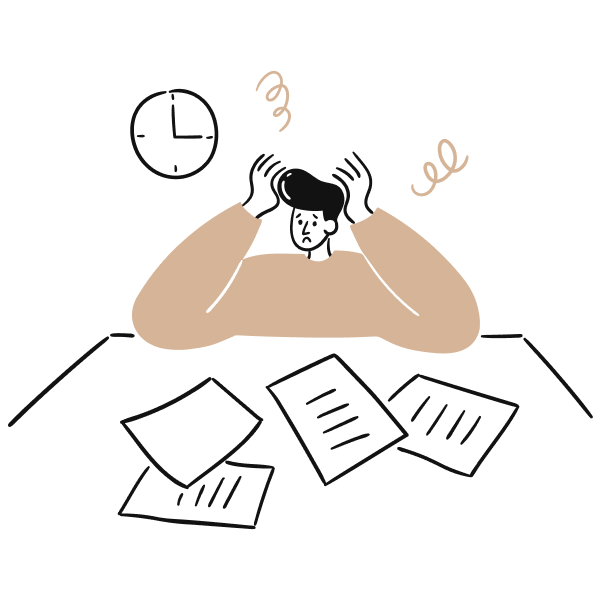You’re stressed and you want to do something about your stress-related symptoms. Fortunately, it is possible to reduce stress. You can get started today. Read on to learn our psychologists’ advices for tackling stress and explore possible treatment options.
How to Relieve Stress?
Concrete Tips
The best cure for stress is to do activities that restore your energy and help you to relax. Take preventative action by putting together a list of five activities that restore your energy in stressful moments. Are you stressed right now? Well, make that list right away and pick an activity to do. Not everything on your list will always be possible, but that’s why it’s great to have a choice of different activities.
Example list
- Hiking through the forest
- Gardening
- Listening to music
- Playing a game
- Calling a friend
Stress-relieving activities
- Plan short moments of relaxation into your day and make sure not to skip over them.
- Read a book, listen to music or paint. Take time for old hobbies or start a new one!
- Get out in nature, hike through the woods or go for a lovely run in the fresh air.
- Do relaxation exercises or breathing exercises.
- Try a trial yoga lesson, practice meditation or have a go at mindfulness.
- Treat yourself to a day at the spa or pamper yourself at home with a foot spa and a face mask.
- Dance! Put on some up-tempo music and dance around your living room.
And be creative: Take five minutes to perform a body scan or breathing exercise while you’re sat on the toilet. Or do ten sets of five squats on your toilet break to take your mind of everything. Your colleagues won’t even notice and it will work a charm.
Developing a healthy lifestyle
You’re most resistant to stressors when your mind and body are healthy. That’s why it’s great to take care of yourself, particularly during stressful periods. It’s important to develop a good sleeping pattern and to keep eating healthily. Try to avoid alcohol and drugs or limit your intake.
Treatment options for stress
The primary treatment used for stress-related symptoms is Cognitive Behavioral Therapy (CBT). This type of therapy can be divided into three parts: Setting boundaries, balance and warning signs.
Setting boundaries
Do you have negative thoughts or do you find it difficult to set boundaries? CBT can help you to acknowledge and protect your boundaries. Behavioral experiments will teach you that your anxious speculations aren’t necessarily a reality. This will give more confidence and determination when it comes to setting boundaries. As a result, you won’t be so likely to overstretch yourself.
Focusing on getting a better balance
There are three factors that can help you to achieve a better balance, even when you’re stressed.
- Structure and routine
This helps you to know where you stand and protects you from doing too much. - Rest and relaxation
Learn how best to relax so that you can face stressful situations with more peace of mind. - Fun and distraction
Discover what brings you joy and what gives you positive energy. These things will distract you from stressful situation and simultaneously refuel your positive energy reserves.
A stoplight warning sign system
Think in terms of the three stoplight colors (green, amber and red) when you start to notice the warning signs of stress. This will help you to figure out which phase of stress you’re currently in and what you can do to feel better.
Help
Do you need someone to answer your questions, offer immediate help, or just provide a listening ear? A psychologist can help you. She or he can help in learning how to handle stressful situations and can offer you tools to relieve your stress.
-
Do you have questions about treatments? Call us on +31207717996 and we will give you personal advice and help creating a treatment plan.
-
At iPractice we use blended care. This is a combination of online and offline therapy. You’ll have face-to-face conversations with a consulting psychologist and you’ll also have access to an online psychologist. This means that you can ask questions and share your thoughts whenever you like.
-
Cognitive Behavioral Therapy is a common therapy to get stress under control and to reduce your stress-related symptoms.


 Nederlands
Nederlands




